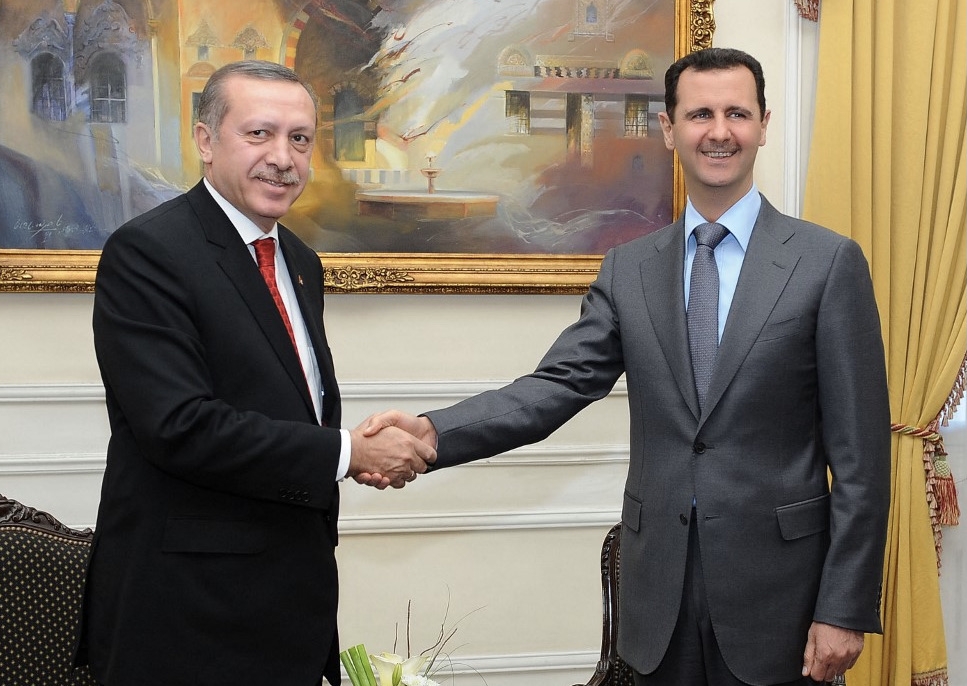Why peace between Turkey and Syria is a long way off

After more than a decade of hostility, rumours abound that Turkey may be entertaining reconciliation with Bashar al-Assad’s Syria.
Mevlut Cavusoglu, Turkey's foreign minister, announced in late April that security talks were held between Ankara and Damascus, which some have interpreted as the first step in a wider rapprochement.
Meanwhile, Turkish President Recep Tayyip Erdogan, who was the driving force behind Ankara’s move to cut ties and back Assad’s enemies during the Syrian civil war, has done little to dismiss these claims.
To some, a move towards peace with Damascus makes sense for Erdogan. Domestically, his rivals in the upcoming June 2023 elections advocate repatriating large numbers of Turkey’s increasingly unpopular 3.6 million Syrian refugees. Normalising ties with Assad could steal his opponents’ thunder, opening the possibility of his leading the drive to send the refugees home himself.
Erdogan's priorities are domestic. Turkey’s economy is nose-diving and there is a good chance he could lose power in 2023
Internationally, Erdogan has recently improved ties and secured vital economic investment from the UAE, which has long lobbied fellow Middle Eastern governments to bring Assad in from the cold. Restoring ties with Syria would seem a logical next step in Erdogan’s regional pivot.
Stay informed with MEE's newsletters
Sign up to get the latest alerts, insights and analysis, starting with Turkey Unpacked
However, such a rapprochement seems unlikely. In reality, peace talks suit neither Erdogan nor Assad at present. The Turkish president’s priorities are domestic. Turkey’s economy is nose-diving and there is a good chance he could lose power in 2023 after two decades in charge. It makes sense to raise the possibility of negotiating with Assad as a means to outflank his opponents.
Suggesting his re-election would lead to normalisation with Syria and the return of some refugees might sway wavering voters, especially his former coalition partners, the nationalist MHP. But it is unlikely such a rapprochement would take place before the election. Instead, low-level talks might be held to maintain the illusion, only for them to cease if and when Erdogan is returned to power.
Washington's role
Peace with Assad is not a strategic priority for Erdogan. The UAE might welcome Turkish-Syrian normalisation, but they have not made it a condition of the recent Abu Dhabi-Ankara detente.
Turkey’s key western ally, the US, in contrast, is firmly against rapprochement with Damascus. Despite recent disagreements with Washington, Ankara still hopes it can persuade the US to end its alliance with Kurds in eastern Syria, allowing the Turkish military a free hand against a group it considers terrorists. But any Turkey-Syria deal would make Washington even more likely to stand by its Kurdish ally.
Finally, Erdogan will likely hold off making major changes to his Syria policy until it is clear how much the Ukraine war will impact Assad’s main ally, Russia. Were Moscow to be seriously damaged by the conflict, or if Vladimir Putin were toppled, it would likely weaken its position in Syria, allowing Erdogan more freedom to dictate peace terms to a severely depleted Assad.
In contrast, were Putin to survive and come out of the war more confident, it would limit Turkey’s options in Syria. While there might be a case for Ankara pushing a deal on Assad now while Russia is distracted, it would be highly risky: Putin would not quickly forget such a betrayal.
The Ukraine war also makes Assad unlikely to be interested in talks with Erdogan. The Syrian president is at his weakest in years, with Russia’s woes raising questions over how much economic and military support it can keep providing to Damascus.
But Assad, who was not willing to compromise or negotiate with his foreign or domestic opponents even when on the cusp of losing power during the civil war, will not be willing to make concessions to Turkey now. Even if the Syrian dictator were interested in a deal, he would wait until the outcome from Ukraine is clearer rather than negotiate now from a position of weakness.
Yet Assad isn’t really interested in negotiating, at least not on Erdogan’s terms. The Turkish president would want to maintain control over the three buffer zones in northern Syria, which Ankara administers through Syrian rebel proxies. He would also want to ensure Idlib remains out of Assad’s reach, to ensure none of its 3 million civilians head to Turkey to add to the refugee population.
Regime’s mindset
Yet both of these are unthinkable to Assad, who has vowed to reconquer "every inch" of pre-war Syria. The Ba’athist regime has held out for 55 years to regain the Golan Heights from Israel, rejecting peace offers on the insistence that it must regain every scrap of lost territory.
Such stubbornness, framed as nationalist resistance, is baked into the regime’s mindset and will be applied to the Turkish-dominated north.
Assad will also be aware of the Turkish domestic situation. None of Erdogan’s election rivals is as committed to the Syrian war as he is, making them more attractive negotiating partners if they win in 2023.
An opposition victory might see Turkey withdraw unilaterally from the buffer zones and Idlib, or at least be willing to offer Assad more generous terms. They are likely to be less steadfast on the north than Erdogan, so it is worth Assad holding back serious engagement until after the elections.
All this suggests a Turkey-Syria reconciliation remains some way off, given that neither Erdogan nor Assad is genuinely interested. That doesn’t mean low-level talks will not occur, but a substantial detente appears unlikely.
The one factor that might shift this is if Erdogan loses in 2023. A new government in Ankara could plausibly seek to draw a line under "Erdogan’s war" by negotiating with Assad on generous terms.
But even then, Assad will likely only accept normalisation for a full return of lost territory, which may prove a tall order for Ankara.
The views expressed in this article belong to the author and do not necessarily reflect the editorial policy of Middle East Eye.
Middle East Eye delivers independent and unrivalled coverage and analysis of the Middle East, North Africa and beyond. To learn more about republishing this content and the associated fees, please fill out this form. More about MEE can be found here.







